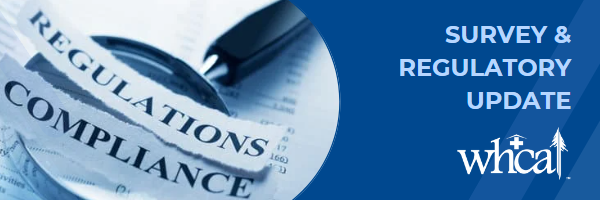Dec 20 2023 | Cannabis in Assisted Living
Washington state was an early legalizer of both medical and recreational marijuana. The legalization of cannabis in the state prompted long term care providers to develop policies and procedures on residents acquiring, storing, and using marijuana on the facility premises. And now, as the cannabis industry flourishes with new strains and methods of consumption and application, it seems long term care providers are constantly reviewing and updating their policies.
People over the age of 65 are the fastest growing users of recreational and medical marijuana across the nation. There are careful considerations, then, for long term care providers when determining what, if any, limitations on cannabis use to implement for residents living in the assisted living.
In 2015, Residential Care Services (RCS) published a Dear Provider Letter (still listed as “current” on the DSHS website) on the topic of cannabis use in assisted livings. The letter outlines the ideas that RCS cannot offer regulatory guidance and will not cite facilities for allowing residents to use cannabis as long as the provider ensures the residents are safe and there are clear policies in place, so residents and staff know what is expected.
Every facility should have a policy and procedure on resident cannabis use, even if the topic has never been an issue. There are some considerations, outlined below, when determining reasonable policies in the assisted living setting.
- FACILITY OWNER/LEADERSHIP PHILOSOPHY. Regardless of the appetite for cannabis use on the facility property, it is recommended that the facility revisit their policy at least annually to consider adjustments and/or updates.
- Because cannabis is federally illegal, the facility leadership can opt to not allow its use at all, regardless of the type (medical or recreational).
- If the facility opts for a “no pot” policy, ensure prospective and current residents are aware.
- Similar to smoking policies, the provider may need to reasonably accommodate the resident’s continued use of cannabis should the facility opt to become a “no cannabis” campus. That means, a resident who uses cannabis at the time a facility adopts a “no cannabis” policy would need to be allowed to continue using the products until the resident chooses to stop on his/her own or the resident permanently moves from the facility. The facility cannot issue a discharge notice for a resident who chooses to follow the cannabis policy that was in effect when s/he moved into the facility.
- The facility leadership could opt for a range of cannabis use to include all types, smokable only, edible only, tincture, etc. Again, prospective and current residents should be made aware of the policy.
- RESIDENT ABILITIES AND PREFERENCES. The assessment criteria for assisted living facilities includes the expectation that a resident be assessed for history of substance use, as well as significant known behaviors that could cause concern or require special care. If the resident smokes marijuana, the facility must conduct a smoking assessment to determine the resident’s abilities to smoke safely. Accommodation and/or negotiations might be warranted to enhance the resident’s safety based on the outcome of the assessment. Also note that residents who use cannabis in any form may require additional supervision and/or care when under the influence of the drug; these additional service needs should be listed in the negotiated service agreement.
- ACQUISITION OF CANNABIS. How the resident accesses marijuana should be included in the resident’s negotiated service agreement. Because cannabis is federally illegal, it is not recommended that staff are involved in purchasing and/or delivering marijuana to a resident.
- RESIDENT STORAGE. The resident should be able to safely and securely store the products and paraphernalia in order to ensure other residents, staff, and visitors do not have access to the items. Storage methods should be listed in the resident’s negotiated service agreement. In some instances, if a resident is unable to safely store the drug, consider the possibility of family delivering it at the time of consumption, and immediately taking the drug offsite when the resident is finished. Because cannabis is federally illegal, it is not recommended that staff store the resident’s marijuana.
- STAFF INVOLVEMENT. Staff assisting with the acquisition and/or delivery of medical or recreational marijuana can put their careers at risk. Because marijuana is considered a schedule 1 drug, it is illegal federally. Medication staff at the assisted living must work within their scope of practice; to assist with or administer a medication they must have a prescriber’s order. A doctor, nurse practitioner, PA-C, or other prescriber in Washington state cannot legally prescribe a schedule 1 drug (they can RECOMMEND marijuana, but cannot PRESCRIBE it); therefore, a medication staff person cannot legally assist with or administer it. See the 2017 Washington Board of Nursing article on this topic, here.
There is a different type of cannabis that is available over the counter that contains less than 0.3% THC. This type of cannabis is often sold at pharmacies, convenience stores, and gas stations and can come in the form of creams, lotions, tinctures, and even gummies. It is recommended to have a policy on this as well; please note that since this type of cannabis is considered legal in all states and is not federally banned, the policy for these types of cannabis-containing items will likely look much different and allow residents the freedom to use these items.
If you have questions about cannabis use in assisted living, or other questions about assisted living, email Vicki McNealley or call 360-352-3304 extension 107.
Posted in Assisted Living, Survey & Regulatory

